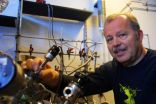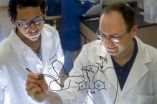(Press-News.org) Agricultural – or Neolithic – economics replaced the Mesolithic social model of hunter-gathering in the Near East about 10,000 years ago. One of the most important socioeconomic changes in human history, this socioeconomic shift, known as the Neolithic transition, spread gradually across Europe until it slowed down when more northern latitudes were reached.
Research published today, Friday, 3 December 2010, in New Journal of Physics (co-owned by the Institute of Physics and the German Physical Society), details a physical model, which can potentially explain how the spreading of Neolithic farmers was slowed down by the population density of hunter-gatherers.
The researchers from Girona, in Catalonia, Spain, use a reaction-diffusion model, which explains the relation between population growth and available space, taking into account the directional space dependency of the established Mesolithic population density.
The findings confirm archeological data, which shows that the slowdown in the spreading of farming communities was not, as often assumed, the result of crops needing to adapt to chillier climates, but indeed a consequence of the struggle for space with prevalent hunter-gatherer communities.
In the future, the researchers' model could be used for further physical modeling of socioeconomic transitions in the history of humanity. As the researchers write, "The model presented in this work could be applied to many examples of invasion fronts in which the indigenous population and the invasive one compete for space in a single biological niche, both in natural habitats and in microbiological assays."
INFORMATION:
The researchers' paper can be downloaded for free from Friday 3 December 2010 here: http://iopscience.iop.org/1367-2630/12/12/123002/fulltext
Farmers slowed down by hunter-gatherers: Our ancestors' fight for space
2010-12-04
ELSE PRESS RELEASES FROM THIS DATE:
Decreased physician reimbursement for hormone therapy may reduce over-treatment of prostate cancer
2010-12-04
The use of androgen suppression therapy (AST) in prostate cancer for low-risk cases declined following a decrease in physician reimbursement, according to a study published online TK in The Journal of the National Cancer Institute. However, the indicated use of AST for metastatic disease in the palliative setting did not decline in the same period.
The use of AST in prostate cancer increased more than threefold between 1991 and 1999 both for patients with metastatic cancer and those with low-risk disease, but AST treatment in the latter group has not been shown to improve ...
Assessing positive outcomes of phase III trials
2010-12-04
Randomized phase III studies should be designed to find out whether a new drug or treatment makes a meaningful difference in patients' survival or quality of life, according to a commentary published online December 3rd in The Journal of the National Cancer Institute. Instead, most trials now are designed to detect a statistically significant difference between treatment and control groups, which may not be clinically meaningful, write Alberto Ocana, M.D., Ph.D. and Ian F. Tannock, M.D., Ph.D., of Princess Margaret Hospital in Toronto.
Regulatory agencies such as the ...
Improvement needed for mastectomy outcome reporting
2010-12-04
Improved standards for outcome reporting in breast reconstruction are needed, according to a review published online December 3rd in The Journal of the National Cancer Institute.
Every year in the United States up to 40% of women with breast cancer undergo a mastectomy. They say the most valuable factor in their decision-making is information from health professionals. However, that information is largely dependent on the quality, reporting, and interpretation of research data on surgical procedures.
To summarize the reporting standards of surgical outcomes in breast ...
Breast CT imaging system marches forward as pain-free tool to aid mammograms
2010-12-04
While questions persist about the best ways to detect breast cancer early, a CT imaging system developed at the University of Rochester Medical Center and first unveiled five years ago is in a better position today to enter the fray -- at least in a supporting role to conventional mammography.
URMC radiologist Avice O'Connell, M.D., was invited to summarize the studies conducted thus far on the Cone Beam Computed Tomography (CBCT) scanner, at the Radiological Society of North America Annual Scientific Assembly in Chicago at 8:30 a.m. (EST) on Friday, December 3, 2010.
O'Connell ...
Anesthetic gases heats climate as much as 1 million cars
2010-12-04
When doctors want their patients asleep during surgery they gently turn the gas tap. But Anaesthetic gasses have a global warming potential as high as a refrigerant that is on its way to being banned in the EU. Yet there is no obligation to report anaesthetic gasses along with other greenhouse gasses such as CO2, refrigerants and laughing gas.
One kilo of anaesthetic gas affects the climate as much as 1620 kilos of CO2. That has been shown by a recent study carried out by chemists from University of Copenhagen and NASA in collaboration with anaesthesiologists from the ...
Dynamics of chaperone protein critical in rescuing brains of Alzheimer's mice from neuron damage
2010-12-04
Tampa, FL (Dec. 3, 2010) -- Dynamic regulation of the chaperone protein Hsp27 was required to get rid of abnormally accumulating tau in the brains of mice genetically modified to develop the memory-choking tau tangles associated with Alzheimer's disease, a University of South Florida-led study found.
Researchers at the USF Health Byrd Alzheimer's Institute demonstrated that the effective switching of Hsp27 between its active and deactivated states was critical on two fronts -- to promote the recycling of the tau protein in healthy nerve cells and to clear abnormal tau ...
Data mining depression
2010-12-04
Could information technology and data mining techniques be used to improve the diagnosis and treatment of depression? That's the question scientists in Australia hope to have answered in a forthcoming issue of the International Journal of Functional Informatics and Personalised Medicine.
Maja Hadzic, Fedja Hadzic and Tharam Dillon of the Digital Ecosystems and Business Intelligence Institute, at Curtin University of Technology, in Perth, explain how depression is rapidly emerging as one of the major health problems now facing society. They add that the World Health Organization ...
Polymeric porous framework of a bismuth citrate-based complex: A potential vehicle for drug delivery
2010-12-04
YANG Nan, MAO ZongWan and SUN HongZhe et al., at the Department of Chemistry, University of Hong Kong and Sun Yat-sen University have characterized a series of bismuth citrate complexes by X-ray crystallography and modeled the structure of ranitidine bismuth citrate, a medicine used widely for the treatment of peptic ulcer and gastric reflux disease. The polymeric framework of bismuth citrate may serve as a "drug carrier" for delivery of other drugs in the human body. This significant contribution is reported in SCIENCE CHINA Chemistry 2010, 53(10).
Elements that possess ...
Faulty gene linked to disorders of sexual development
2010-12-04
Scientists have discovered that the alteration of a single gene could cause some male embryos to develop as females.
The breakthrough will improve diagnosis and clinical management of patients with disorders of sex development (DSD). These conditions occur when the testis or ovary does not develop properly in the embryo, causing genital abnormalities in one in 4500 babies.
An international team including researchers from the Murdoch Childrens Research Institute and the University of Melbourne identified the gene alteration in a group of patients including two families ...
Your Web surfing history is accessible (without your permission) via JavaScript
2010-12-04
The Web surfing history saved in your Web browser can be accessed without your permission. JavaScript code deployed by real websites and online advertising providers use browser vulnerabilities to determine which sites you have and have not visited, according to new research from computer scientists at the University of California, San Diego.
The researchers documented JavaScript code secretly collecting browsing histories of Web users through "history sniffing" and sending that information across the network. While history sniffing and its potential implications for ...


